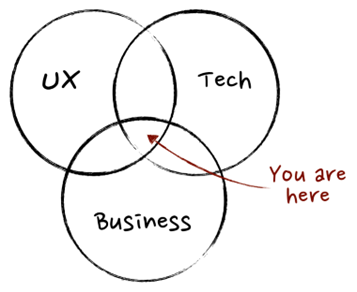The Product Manager is an increasingly present and important figure in many companies, but who is the Product Manager? And what does he/she do? What skills are required to fulfil this role?
Who is the Product Manager?
In the book Inspired, Marty Cagan says that the job of the Product Manager is to “find out that a product is valuable, usable and viable“.
Martin Eriksson, product leader and founder of ProductTalk, has defined the role of the Product Manager as one that must be at the intersection of Business, Technology and User Experience:

Therefore, the success of a product and/or service depends very much on the vision of the Product Manager and his or her ability to get the team to work together to turn this vision into reality. The Product Manager is primarily responsible for Product Planning and execution throughout the Product Lifecycle.
What is the responsibility of the Product Manager?
A Product Manager must be able to identify the customer’s needs and requirements and combine them with business objectives in such a way that the service and/or product produced satisfies both. The product must reflect the business strategy and the success of a product and/or service depends very much on the Product Manager’s vision and his or her ability to bring the team together to turn the vision into reality.
But in practice, what are the tasks associated with the role of Product Manager? The main responsibilities include:
- Collect and prioritise product and customer needs
- Do in-depth research on problems and possible solutions
- Define the product vision and work closely with engineering, sales, marketing and other departments to ensure that revenue and customer satisfaction targets are met
- Coordinate with all stakeholders and coordinate communication flows between them
- Monitor the market and carry out competitive analyses
- Work in synergy with third parties to realise partnerships and opportunities
- Show demos to customers
- Manage the overall budget
- Set prices in such a way that they meet turnover and profitability targets
Product Manager: competencies and skills
As mentioned earlier, the role of the Product Manager fits into the intersection of three main areas: Business, Technology, User Experience. These three areas also correspond to the main hard skills required for this role.
Hard Skills related to Business, Technology and User Experience
The role of the Product Manager is centered around the Business Needs, and the main objective is to maximise the value of a product: optimising a product to achieve business results while maximising the return on investment.
Obviously, a Product Manager must also have some Technological Skills, otherwise he/she would not be able to ‘put his/her hands’ where they are needed and would not be able to coordinate work. This obviously does not mean that the Product Manager must be able to programme or create software, but he/she must have the necessary skills to be able to make informed decisions.
The Product Manager is also the ‘voice of the customer within the organisation’ and must certainly have skills in User Experience and customer satisfaction. Again, this does not mean having in-depth skills, but the professional is still expected to have a good knowledge of the subject.
In practice, again quoting Martin Eirksson, a competent Product Manager must have in-depth experience in at least one of these areas, be passionate about all three and be able to have a conversation with industry professionals about each of these areas.
Soft Skills of the Product Manager
- Leadership: Leading and coordinating all stakeholders obviously requires a strong need for leadership, a fundamental prerequisite to be able to perform this role to the best of one’s ability
- Critical and analytical thinking: Product Managers need to be able to analyse information and data in order to provide their team with an effective and coherent strategic direction
- Flexibility: Knowing how to work flexibly and having the readiness to drive change quickly and consciously is a key skill for the role
- Problem solving: Solving problems and responding to needs; the Product Manager must ensure that the product created achieves this objective
- Interpersonal communication: Understanding the needs and priorities of all parties involved, the Product Manager must be able to convey his or her vision to the team and customers in a way that ensures the satisfaction of all parties involved
- Time management: Knowing how to manage one’s time is necessary to manage products, projects, teams and customers to the satisfaction of all parties involved
QRP International is an Accredited Training Organisation that offers different Project Management courses. We can support you with PRINCE2, PM2, PMP, AgilePM or PRINCE2 Agile. Would you like to have more information? Contact us!









